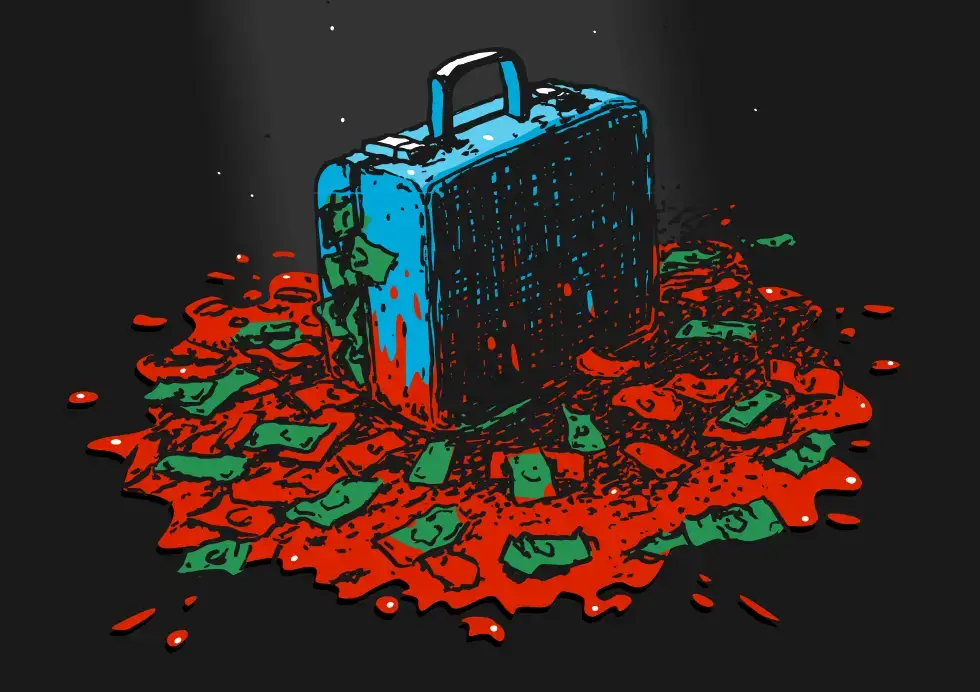A curious, counterintuitive idea has for some time been circulating in the media concerning the war in Ukraine. Despite its patent absurdity, this line of reasoning became the argument that key Republican lawmakers found convincing enough to persuade them to vote, against their better judgment, for the passage of a $61 billion arms package they had spent months resisting.
The revolutionary idea I’m referring to inverts the standard moral logic our society has traditionally applied to war. Some clever pundits and politicians have successfully applied that great American resource, “the power of positive thinking” to remove the traditional stigma of war as evil and turn it into a model of good financial management.
Republican Senator Mitch McConnell may have been the first to articulate the idea. To mark the anniversary of Russia’s invasion in February 2023, the minority leader of the Senate proclaimed that “U.S. aid to Ukraine is a ‘direct investment’ in the country’s interests and against Russian President Vladimir Putin’s ‘war machine’.” To buttress his case, he indulged his fancy, imagining the geopolitical future as if it were a scenario in a video game. “If Putin were given a green light to destabilize Europe, invading and killing at will, the long-term cost to the United States in both dollars and security risks would be astronomically higher than the minuscule fraction of our GDP that we have invested in Ukraine’s defense thus far.” McConnell’s Putin isn’t Hitler. He’s Genghis Khan as a character in an action-packed Hollywood movie.
McConnell sowed the seed that seven months later flowered and took a more realistic form in the brain of former private equity executive and presidential candidate Senator Mitt Romney. After evoking Washington’s noble effort to use Ukraine to weaken the Russian economy, he explained: “To be able to do that with five per cent of your military budget strikes me as an extraordinarily wise investment and not by any means something we can’t afford.”
Today’s Weekly Devil’s Dictionary definition:
Investment:
In classic capitalism the allocation of money to create value; in late-stage capitalism, the allocation of money to destroy challenges to monopoly.
Contextual note
What McConnell and Romney may have intended more as a metaphor that literal truth has taken its place as orthodoxy in the Beltway credo about Ukraine. It has become to go-to argument evoked endlessly and with great solemnity by NATO’s secular priesthood, in the US and Europe in its effort to overcome Republican resistance to further funding for Ukraine.
In the runup to last month’s successful vote in the House, the Atlantic Council echoed Romney’s description: “To be able to do that with five per cent of your military budget strikes me as an extraordinarily wise investment and not by any means something we can’t afford.”
In February of this year, NATO chief Jan Stoltenberg parroted the same message. “I strongly believe that it’s a good deal for the United States to support Ukraine. It’s not charity, it’s an investment into their own security.” He then made a key point: “By allocating a fraction of our defense budgets we have enabled the Ukrainians to destroy significant parts of the Russian combat capability without putting any NATO soldier, any US soldier, in harm’s way.”
UK foreign minister and former Prime Minister Lord David Cameron made the same case just a month ago. “I argue that it is extremely good value for money for the United States and for others. Perhaps for about five or 10% of your defense budget, almost half of Russia’s pre-war military equipment has been destroyed without the loss of a single American life. This is an investment in United States security.” The recently named lord is no elitist. He uses the language of the consumer society to make his case when he points out it is “a good value for money.”
Lord Cameron didn’t stop there. In so doing, he absurdly appeared to endorse Putin’s own assessment of Western policy when he claimed back in July 2022 that the West would wage a war “until the last Ukrainian is left standing.” Here are Cameron’s words uttered in April 2024: “The best thing we can do this year is to help keep the Ukrainians in this fight. They’re fighting so bravely — they’re not going to lose for want of morale.”
Western leaders see this prolongable war as an investor’s dream scenario. Not only is profit guaranteed; there is zero risk since none of our people are dying for the cause. The profit to be calculated is any damage the Ukrainians manage to do to Russia. In such a scenario, the cost to the economy isn’t zero. Better than that, it’s negative. This support of Ukraine has allowed the West to clear out its ancient stocks of armaments and begin producing a generation of up-to-date weaponry. And, though the same investment analysts avoid mentioning it, even the monetary cost ultimately falls on the Ukrainians. These are sales of weapons, on a lend-lease basis, and not outright gifts. The Ukrainians are a godsend to America: an entire population ready to pay in both dollars and their lives to fulfill Washington’s mission of neutralizing Russia.
Of course, the only people who actually do have to pay for the expense are Western taxpayers. They supply the money that goes directly to the great arms manufacturers, whose wealth already rivals Croesus.
In other words, we can compare Western politicians to teenagers playing a video game. They can try all kinds of things that may fail, producing impressive explosions, knowing that in all cases they and their people will live to play again. Even better, as the Center for Strategic International Studies argues, this video game simulation we call a war provides the main player an opportunity to improve its skills and confirm its dominant position, even in relation to its allies: “Such aid helps to rebuild and strengthen the role America plays as the de facto leader of the West and other democratic states.”
War used to be about measuring and parrying the risk to one’s own troops, national infrastructure and the nation’s citizens. All that has changed. With the knowledge that only the citizens of a distant land will be sacrificed, one can freely speculate on the financial gains such an operation should produce.
Historical note
Why has no one in the media noticed this change of attitude that has taken place over the past few decades?
During the Vietnam War, the message on one side was “make love, not war.” On the other side, it was a form of historical teleology celebrating the emergence of the greatest nation in the history of the world, buttressed by a domino theory. It reflected Superman’s mission: to fight for “truth, justice and the American way.” In those pre-Gordon Gekko days, no one would have confused “the American way” with Gekko’s dictum, “greed is good.” But Gekko’s thinking has structured the current ideology. The current motto could be formulated as “make money, not war nor love.” But arrange things so that others make war and do the actual fighting.
The Superman cartoons of the 1950s provided the ultimate justification for the military-industrial complex (MIC) that was taking root at that time. It has become possibly the most effective instrument of greed mankind has ever invented. Unlike Midas, Croesus, Lorenzo de Medici or even John D Rockefeller, the MIC is a truly democratic institution, insofar as it is open to all those with the ambition to embrace it. It is composed of a series of entities that exercise an unassailable monopoly that promotes a stratospheric concentration of wealth.
The MIC includes much of the government itself, to the extent that its members are treated to a permanent ride on what may be described as the fast track for insider trading, Some, more skillful and motivated than others, are particularly adept at exploiting its promise. Others avoid the temptation while tacitly acknowledging and accepting its existence. It is democratic in the sense that it sits there for everyone’s eventual profit. And that is precisely why the media – who have their own privileged place within the complex – avoid answering the question I asked at the beginning of this section.
*[In the age of Oscar Wilde and Mark Twain, another American wit, the journalist Ambrose Bierce produced a series of satirical definitions of commonly used terms, throwing light on their hidden meanings in real discourse. Bierce eventually collected and published them as a book, The Devil’s Dictionary, in 1911. We have shamelessly appropriated his title in the interest of continuing his wholesome pedagogical effort to enlighten generations of readers of the news. Read more of Fair Observer Devil’s Dictionary.]
The views expressed in this article are the author’s own and do not necessarily reflect Fair Observer’s editorial policy.
Support Fair Observer
We rely on your support for our independence, diversity and quality.
For more than 10 years, Fair Observer has been free, fair and independent. No billionaire owns us, no advertisers control us. We are a reader-supported nonprofit. Unlike many other publications, we keep our content free for readers regardless of where they live or whether they can afford to pay. We have no paywalls and no ads.
In the post-truth era of fake news, echo chambers and filter bubbles, we publish a plurality of perspectives from around the world. Anyone can publish with us, but everyone goes through a rigorous editorial process. So, you get fact-checked, well-reasoned content instead of noise.
We publish 2,500+ voices from 90+ countries. We also conduct education and training programs
on subjects ranging from digital media and journalism to writing and critical thinking. This
doesn’t come cheap. Servers, editors, trainers and web developers cost
money.
Please consider supporting us on a regular basis as a recurring donor or a
sustaining member.
Will you support FO’s journalism?
We rely on your support for our independence, diversity and quality.







Comment